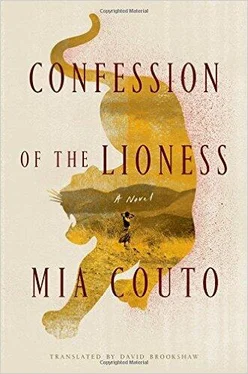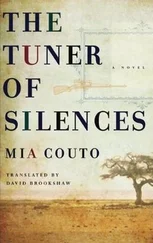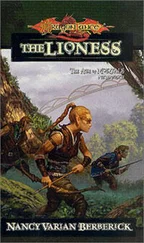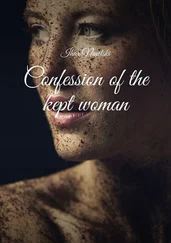Maliqueto, please take the First Lady away. She’s disturbing our little workshop here.
A few get rich. The dead work through the night for one or two to get rich.
The meeting turns into a riot. Suddenly no one is speaking Portuguese. The acrimony is happening in another world. A world where the living and the dead need translation in order to understand each other.
Mariamar’s Version: FOUR. The Blind Road
A word that can’t be spoken eventually turns into poisoned spittle.
— AFRICAN PROVERB
Today, my mother told me she’s working as a maid in the administrator’s house, where Archie Bullseye is staying. Every day, she passes my hunter. Perhaps she’s doing this on purpose, to humiliate me. Without me even asking her, my mother volunteers:
This fellow Archie is sick, the sickness of hunters has taken over his body.
If her intention is to hurt me, I feign no interest in my reply. I don’t want to know. My nation is no longer just the village, or even my own home: It’s this solitary spot. The garden where I’m confined.
I contemplate my legs and think how they are now dispensable. I almost miss the time, a while ago now, when I was paralyzed, as if my lower limbs no longer spoke the same language as the rest of my body. That’s what I yearn for today: a language my body doesn’t understand and that I can only speak in my dreams.
* * *
Our feet are born in our head, our whole body begins in our head, just as the rivers descend from the sky. That’s what my beloved grandfather, Adjiru Kapitamoro, used to say, and up to this day I think he was right. My legs went to sleep when my head awoke. One day, when I was twelve years old, I fell to the floor next to the bed like an empty sack. The family crowded around me, and Adjiru pulled at my father’s jacket:
Was it you, Genito?
I quickly answered in order to protect my old father. No one was to blame, and there was a likely explanation. I’d just had bad dreams during the night, with visions that I dared not remember. They pulled me to my feet and I collapsed again, devoid of any internal support.
Of all times now, in the middle of all this war , my father lamented. She’s going to be yet another burden.
Since when was a daughter a burden? Adjiru queried.
In childhood, one’s body only has one use: to play. But not in Kulumani. The children in our village asked their legs to help them run away in the face of gunfire, faster than bullets. This was the time when our villages were pounded by artillery. At the end of the day, the ritual was always the same: We would pack up our possessions and hide in the bush. For me, this procedure was a game, a recreation shared with the other children. In a world of explosives and blood, we would invent silent pastimes. In our nocturnal hiding place I learned to laugh inside me, to shout voicelessly, to dream without dreams. Until the day when my lower half was no longer mine. And I fell to the floor next to the bed.
* * *
After I became paralyzed, it was my grandfather Adjiru who, at the end of the day, would come and fetch me and carry me off into the forest in his arms. All the others had already withdrawn, and it was just me left, along with one or two worthless objects spread across the floor. While I waited for my grandfather’s secure arms, one certainty gripped me ever more forcefully: I was a thing and I would be buried like an object in the dust of Kulumani.
I, Mariamar Mpepe, was doubly doomed: to have only one place in the world and to harbor only one life. An infertile woman in Kulumani is less than a thing. She merely embodies inexistence. People said it was my mother’s fault that I was like that. Hanifa Assulua had been cursed. As a result of pressure from the Catholic priests, her family had barred her from being subjected to the rituals of initiation. My mother was a namaku , a girl who had never made the transition to womanhood. She had been baptized in the church, but she had never undergone the ceremony of the ingoma , which allows a girl to come of age. Hanifa was condemned to eternal childhood.
* * *
My father was certain: After my limbs weakened, I became an encumbrance. But he was unaware that something more serious than paralysis was happening to me. It’s true that my pangs of hunger had grown less acute. On the other hand, I began to suffer from unexpected fits. They happened in late afternoon, before we were taken out to our hiding places in the woods. Only Silência knew what was happening inside our room. According to my sister, during these attacks my behavior became totally different from before: I would crawl along on all fours with the dexterity of a quadruped, I would scratch the walls with my fingernails and roll my eyes ceaselessly. Hunger and thirst made me howl and foam at the mouth. To placate my raving, Silência would place plates of food across the floor and bowls of water. Corralled in a corner of the room, my sister, sobbing with terror, would pray for me to stop licking water and biting plates.
It’s a spell, it can only be a spell , she whimpered.
Despairing over the cause of all this, Silência reproduced the foundational myth of our tribe right outside our front door: In our garden, she buried a statue that had been secretly carved by my grandfather. Legend had it that a wooden statue, buried in the sands of the savanna by the first man, had turned into the first woman. This miracle occurred at the beginning of the world, but Silência prayed night after night that the little wooden statue in our garden might receive the breath of life.
The statue would never gain a soul, but every time Silência sensed that an attack was imminent, she would hurriedly dig up our little wooden sentinel and bring it to me. Then I would lull the statue as if it were my daughter, and as I rocked it gently, a mother’s peace would grow within me. Afterward, I would crawl along, carrying the figurine that I fancied was my legitimate child in my mouth, like a female cat.
* * *
My legs might have been lifeless, but I never became my own prisoner. Every morning, children’s voices would erupt into the garden.
Come on up, Mariamar, climb up on us!
The boys would take turns giving me piggyback rides and would carry me away far from home, scrambling around joyfully. Carried on their backs like a baby, I experienced every merry little game there was. Today, I can safely say this: I enjoyed a childhood delegated to me by other children. Hanging from someone’s neck, riding on some nameless back, I wasn’t even aware when my chest rubbed against a boy’s sweat.
If you do that, your breasts will never grow , my sister Silência warned.
In Kulumani, breasts are a signal: Depending on their volume, mothers know when they should subject their daughters to the ritual of initiation. What to me was an innocent game was an insult as far as the village was concerned. Women saw me riding on the backs of boys and would turn their faces away in embarrassment. It’s in the piggyback position that godmothers, the so-called mbwanas , carry the girls who are going to mutate into women to the ceremony. It was this that the women found unforgivable: I was anticipating and disrupting an occasion that they wished to keep sacred and secluded. As the daughter and granddaughter of people educated in Portuguese, I had no place in a world governed by outmoded rules. My sin became even worse because of the time of crisis in which we lived. The more the war robbed us of our certainties, the more we lacked the security of a past ruled by order and obedience.
* * *
One day, some boys went to Palma and stole an unused coffin. They brought it back at night and told me:
Читать дальше












